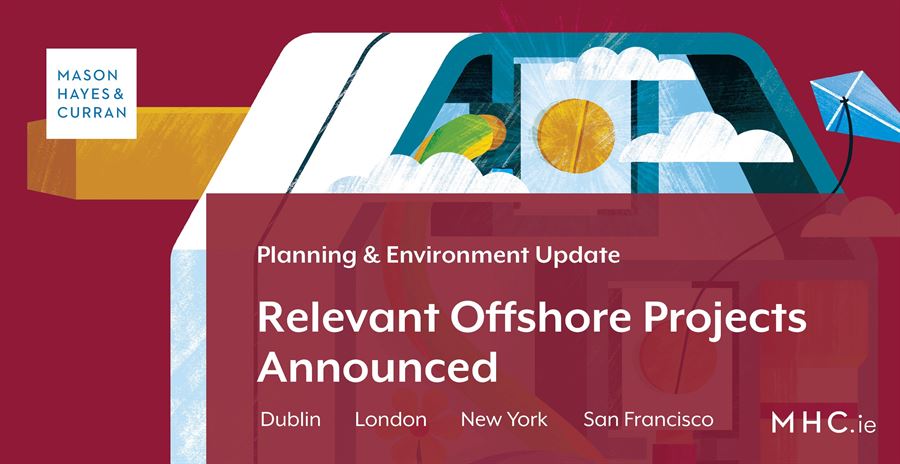
The Minister for Housing and Urban Development and the Minister for Communications, Climate Action and Environment announced on 19 May 2020 the seven offshore renewable energy projects that have been designated as Relevant Projects. These projects will be in a position to apply under the new marine planning regime, once enacted, for planning permission for their offshore developments.
![]() The projects are:
The projects are:
-
Oriel Wind Park
-
Innogy Renewables (2 projects at Bray and Kish Banks)
-
Codling Wind Park (2 projects, namely Codling I and Codling II)
-
Fuinneamh Sceirde Teoranta (Skerd Rocks)
-
North Irish Sea Array Ltd (North Irish Sea Array)
The new marine planning regime will be introduced by the Marine Planning and Development Management Bill, 2020.
The Irish Government’s Climate Action Plan 2019 (CAP) targets 70% of electricity generated from renewable sources by 2030. The CAP suggests this will be achieved by at least 3.5 GW of offshore renewable energy.
The Marine Planning and Development Management Bill
The Marine Planning and Development Management (MPDM) distinguishes between a development consent or planning permission for a project and a Maritime Area Consent to enable occupation of the maritime area to develop the project. Under the MPDM Bill, developers will need to apply to an Bord Pleanála or the relevant local planning authority, as appropriate, for planning permission for the project. Public consultation, Environmental Impact Assessment and Appropriate Assessment will be undertaken before a planning permission is granted. Only developers who have been granted a planning interest by a relevant Minister will be allowed to apply for planning permission. The planning interest will be time limited and is intended to ensure that proposed developers have the financial and technical capabilities to complete projects.
Offshore renewable energy activities will be the responsibility of the Minister for Communications, Climate Action and Environment. Where there is more than one application for the grant of a planning interest for the same part of the maritime area, the interest may be auctioned among the applicants by means of a tender process limited to those applicants. If planning permission is granted, a developer may then apply for a Maritime Area Consent to enable occupation of the maritime area to develop the project in accordance with the planning permission. The relevant Minister will only be permitted to grant a Maritime Area Consent if he or she has previously granted a planning interest. The intention is that this stage will principally confirm that circumstances have not changed since the planning interest was granted.
Transition protocol for legacy projects
The Transition Protocol was published in December 2019 to give guidance to the sector regarding the treatment of certain legacy offshore wind projects (Relevant Projects) in the context of the MPDM. Relevant Projects to which the Transitional Protocol will apply are:
- Offshore wind projects which applied for, and substantially advanced, or were granted, a lease under the Foreshore Act 1933 (the Foreshore Act), where material changes are proposed to that which were originally applied for and assessed under the Foreshore Acts, which require further assessment, and/or
- Offshore wind projects which have a valid connection agreement from EirGrid, the Transmission System Operator (TSO) or are confirmed by the TSO as eligible to be processed to receive a valid connection offer
The seven projects named above are confirmed as Relevant Projects. As a result of this announcement, they will be given an automatic Planning Interest which will enable them to make an application for planning permission to An Bord Pleanála.
In order to receive a Maritime Area Consent for a Relevant Project under the MPDM, any existing Foreshore Lease relating to the Relevant Project must be surrendered by the Lessee.
On 31 January 2020, the Commission for Regulation of Utilities (CRU), Ireland’s independent energy and water regulator, directed the TSO to commence processing grid connection applications for Relevant Projects. It also requested the TSO to update the CRU once it has further details on the onshore network reinforcements required.
Conclusion
The identification of seven offshore renewable energy projects that will be in a position to apply under the new marine planning regime, once enacted, for planning permission for their offshore developments is another welcome step in the harnessing of Ireland’s considerable untapped offshore wind energy resource.
The new marine planning regime will be introduced by the Marine Planning and Development Management Bill, 2020.
While the final General Scheme of the Marine Planning and Development Management Bill was approved by the Irish Government in December 2019, the General Scheme still needs to undergo pre-legislative scrutiny before the text of the Bill is finalised, passed by both Houses of the Oireachtas (the Irish Parliament) and ultimately enacted by being signed into law by the President of Ireland.
Once the legislation is enacted the seven projects will be entitled by virtue of an automatic Planning Interest to make an application for planning permission to An Bord Pleanála for these offshore developments.
For more information and expert guidance in seeking consents for your projects, contact a member of our Planning & Environment or Energy & Utilities teams.
The content of this article is provided for information purposes only and does not constitute legal or other advice.



